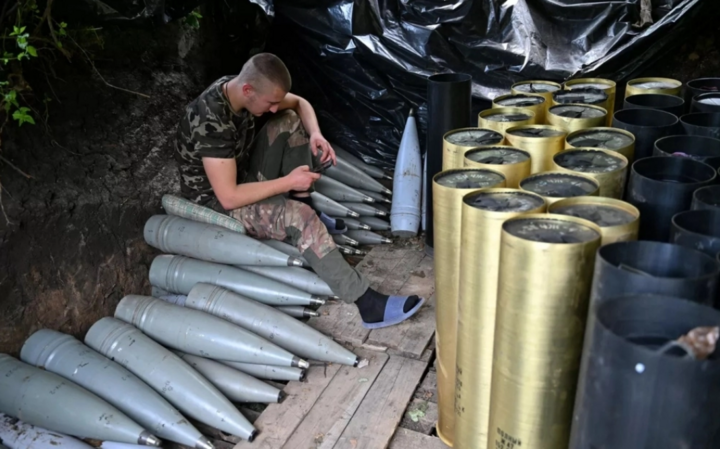Ukraine faces the harsh reality of a shortage of ammunition, especially 155mm artillery shells, after Israel launched its ground operation in the Gaza Strip. In terms of ammunition, how long can Ukraine hold out?

A Ukrainian soldier sits next to artillery shells and propellant casings in Donetsk province in June 2023. (Photo: AFP)
Ukrainian President Zelensky complained to the Western press that NATO's supply of 155mm artillery shells had dropped sharply since the recent outbreak of the Israel-Hamas conflict. Specifically, US publications quoted Ukrainian officials as saying that their supply of artillery shells had dropped by more than 30%.
Meanwhile, Anatoly Matviychuk, a military expert, said: "Ukraine does not have the capacity to produce Western ammunition after all. As for Soviet-style ammunition, they used to have the capacity to produce it, but that industrial capacity is no longer there because it was destroyed by Russian attacks."
Matviychuk explained that currently Russia uses approximately 25,000 - 50,000 artillery shells of various calibers per day, while Ukraine responds with only 7,000 - 11,000 artillery shells.
According to the retired colonel, Ukraine's military activity at the front line has declined.
"Ukraine also does not have air superiority. Ukrainian artillery firepower and long-range weapons, which are supplied by the UK, the US and Germany, have been decreasing. I believe that in the near future, especially during the winter cold, they will begin to suffer losses in firepower. Their casualties are already very high and, in my opinion, from a military perspective, this is very serious," Matviychuk added.
Will the US continue to aid Ukraine's armed conflict?
The budget allocated to Ukraine by the US Congress is now running out. Meanwhile, US Republican lawmakers are opposing a new aid package, requested by US President Biden, worth $ 61 million for Ukraine.
In early November 2023, the Republican-controlled US House of Representatives passed a bill providing $14.3 billion in military aid to Israel while leaving Ukraine out in the cold. The US Senate then blocked the proposal, forcing Republicans to consider a combined aid package for both Israel and Ukraine.
The debate continues. However, Senator Marjorie Taylor Greene (R-Georgia) warned reporters that Republicans would “go crazy” if the House green-lighted billions of dollars in aid to Kiev. According to recent polls, 59% of Republicans think the government is spending too much on Ukraine.
"A very dramatic political struggle is going on in the United States," said former Colonel Matviychuk.
Will Europe pursue supplying ammunition to Kiev?
Recently, German Defense Minister Boris Pistorius admitted that the European Union (EU) is unlikely to achieve its goal of sending one million artillery shells to Ukraine by March 2024. Meanwhile, the real problem is that Ukraine has been consuming ammunition faster than the US and other NATO allies can produce it.
According to Matviychuk, the depletion of EU military ammunition is only part of the problem. The main thing, he said, is that Europeans are skeptical about pouring more ammunition and money into Ukraine.
"Now in the Netherlands, the new prime minister has questioned the feasibility of supplying weapons and equipment to Ukraine. I think Europe is stuck in a very interesting situation. There is no gas, or gas is very expensive. The economy is starting to decline. The Germans are starting to realize the problem... If the conflict continues, European countries will start to distance themselves from it, to focus on their own domestic problems, not on Ukraine's problems," said the military expert.
Similarly, Matviychuk doubts that in the near future Europe will pour its economic resources into the production of artillery shells and military hardware to meet Ukraine's needs.
"This is not in the interests of Europe, but in the interests of the United States, because it is the United States that controls the arms market through Europe. Europe is used to buying everything that is available. Reorienting its economy towards militarization and producing its own weapons is not profitable for them. I think that even developed countries like France and Germany are unlikely to start adjusting their entire economies to military standards. They can improve their defense industrial capacity a little, increase their military production a little, but they will not develop their military economy at an enthusiastic pace," the colonel stressed.
In that context, according to Matviychuk, Russia can wait, perhaps Ukraine withdraws from its current positions or Kiev takes the initiative to initiate peace negotiations.
Trung Hieu/VOV.VN (Source: Sputnik)
Source


























![[Photo] National Assembly Chairman attends the seminar "Building and operating an international financial center and recommendations for Vietnam"](https://vphoto.vietnam.vn/thumb/1200x675/vietnam/resource/IMAGE/2025/7/28/76393436936e457db31ec84433289f72)









































































Comment (0)